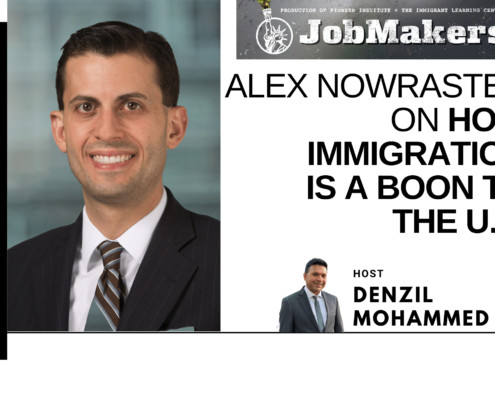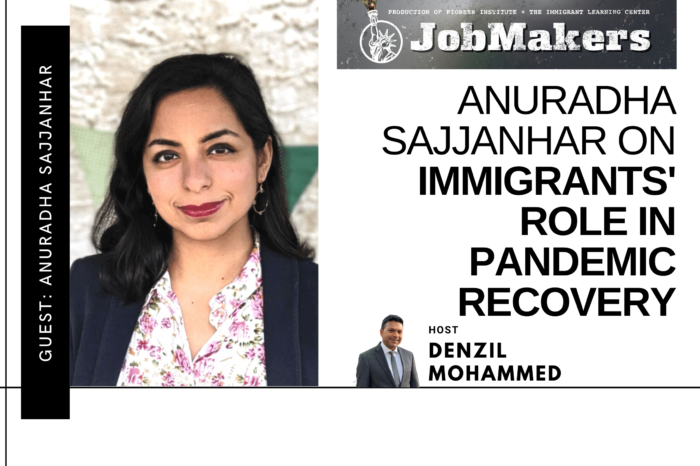Anuradha Sajjanhar, PhD on Immigrants’ Role in Pandemic Recovery
/in Economic Opportunity, Featured, JobMakers, News /by Editorial StaffThis week on JobMakers, host Denzil Mohammed talks with Dr. Anuradha Sajjanhar, lead researcher for the report Immigrant Essential Workers During the COVID-19 Pandemic published by The Immigrant Learning Center, co-producer of this podcast. She found that immigrants, despite playing an outsized role in industries deemed essential such as healthcare, food and agriculture, and the supply chain, were largely left out of federal and state support during the pandemic, which negatively affected their safety and their efforts to help Americans weather this crisis. The report offers a path forward, as you’ll learn in this week’s JobMakers.
Guest:
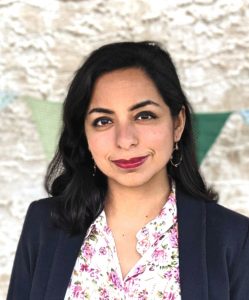 Anuradha Sajjanhar, Ph.D is a 2021-2024 Postdoctoral Fellow in Policy and Governance at the Crawford School of Public Policy, Australian National University, and a New Generation Network Scholar at the Australia India Institute. Her work focuses on the intersection of comparative politics, communication studies, political sociology, and public policy. Her work has been published in Economic and Political Weekly, Journal of Contemporary Asia, and Journal of Political Ideologies, as well as in national and international newspapers. She earned her Ph.D in Sociology from the University of Minnesota in 2020, where she was a Fellow at the Interdisciplinary Center for the Study of Global Change. She holds an M.A in Sociology from the Delhi School of Economics, a B.A in English Literature from the University of York, and has several years of work experience in policy research and evaluation.
Anuradha Sajjanhar, Ph.D is a 2021-2024 Postdoctoral Fellow in Policy and Governance at the Crawford School of Public Policy, Australian National University, and a New Generation Network Scholar at the Australia India Institute. Her work focuses on the intersection of comparative politics, communication studies, political sociology, and public policy. Her work has been published in Economic and Political Weekly, Journal of Contemporary Asia, and Journal of Political Ideologies, as well as in national and international newspapers. She earned her Ph.D in Sociology from the University of Minnesota in 2020, where she was a Fellow at the Interdisciplinary Center for the Study of Global Change. She holds an M.A in Sociology from the Delhi School of Economics, a B.A in English Literature from the University of York, and has several years of work experience in policy research and evaluation.
Get new episodes of JobMakers in your inbox!
Read a Transcript of This Episode
Denzil Mohammed:
I’m Denzil Mohammed and welcome to a special edition of JobMakers.
Denzil Mohammed:
What affects immigrants in the US affects all Americans. Immigration is not a separate issue from any national issue. And the COVID 19 pandemic made this all too clear. As immigrants are overrepresented in industries, deemed essential industries like healthcare, food, and agriculture, the supply chain, let’s be clear. All immigrants in the us make up just 13.7% of the total population, but 17.4% of the labor force and 18.3% of the essential workforce. In fact, while 65% of us born workers are essential. 69% of all immigrants and 74% of undocumented workers are essential for Dr. Anuradha Sajjanhar, lead researcher for the report immigrant essential workers during the COVID 19 pandemic published by the immigrant learning center co-produced of this podcast, she found that immigrants were largely left out of federal. I state support during the pandemic, which negatively affected their safety and the work they were doing to help Americans, whether this pot unprecedented storm, the report, which is available free of charge at www.Ilctr.org shows that immigrants play an outsized role in essential industries that are helping us get through this pandemic that these essential workers felt left out of the hero narrative we painted all essential workers with, and that grassroots bottom up new movements at the local level can fill the void left by federal inaction.
Denzil Mohammed:
As you learn in this week’s JobMakers. Dr. Anuradha Sajjanhar, how are you today?
Dr. Anuradha Sajjanhar:
I’m well, thank you, Denzil. How are you?
Denzil Mohammed:
I’m pretty awesome right now, I escaped the blizzard. Thank goodness. So what was the purpose of this research report? Why do you think it’s important?
Dr. Anuradha Sajjanhar:
Several reasons. I think mainly was, there was a lack in the literature so far, bringing together both intimate narratives of immigrant essential workers along with kind of the zoomed out big picture of how policy decisions during the pandemic have affected them. So what we tried to do with the report is bring attention to of the vital role that immigrants play in the labor market, as well as the need to offer them care and protections. And, you know, we do that through a bunch of interviews, both with immigrant essential workers and with policy experts, advocates in the field and we show how public policies can be improved to benefit immigrant workers. And as a result, the whole country
Denzil Mohammed:
As a result the whole country, that’s, that’s a really important point. So I’m really curious, you know, I I’m core off of this report, but I was not the lead researcher. That was you mm-hmm how did you go about doing this research in the midst of a global pandemic?
Dr. Anuradha Sajjanhar:
Yeah, I think the pandemic really affected the access we had to in building trust with immigrant central workers. I think, you know, a lot of people that I spoke to are very accustomed to being interviewed and potentially to be, to being reset subjects in exploitative ways where they’re not compensated for their time, their stories are used, their names are used without their permission. So it was definitely a process to reach out. So along with the immigrant learning center you and I, we reached out to a bunch of organizations that work with immigrant communities in Minnesota, California, and Texas. And then through those, I was able to, you know, get in touch with immigrant essential workers and between may and August of 2021, I conducted about 20 in depth interviews with essential workers across industries within those three states and 10 interviews with community organizers, policy experts and employers.
Denzil Mohammed:
And, and just to be clear, you did this over zoom or the phone you didn’t fly out there,
Dr. Anuradha Sajjanhar:
Right? Yeah. Yeah. Because of the global pandemic, I did most of it through zoom, honestly, most of it through phone calls, because that’s how the people that I spoke to felt most confident and comfortable by expressing themselves.
Denzil Mohammed:
Interesting. So of all the findings that, that came out of this research what stood out most to you,
Dr. Anuradha Sajjanhar:
I really think it was the irony of the what we identify in, what Cohen and Warren who are researchers have worked on immigrant essential populations in the country have identified as a central policy paradox, which is that foreign born workers are deemed essential at very high rates. Yet they often lack protections, status and face marginalization by us immigration and COVID policies. So, you know, there was this whole cultural effort to thank essential workers and as part of that immigrant essential workers, but despite the heightened attention paid to them during the pandemic, there were no meaningful federal policy interventions to provide protection or benefits to immigrant essential workers and their families, especially undocumented immigrants.
Denzil Mohammed:
So one of the things that stood out to me most was the invisibility of so many immigrant workers. And as you point out in terms of policy, they were also either they were invisible or they were deliberately excluded and marginalized mm-hmm , which I think the latter is, is what happened under the Trump administration. Mm-Hmm can you expand on this in invisibility of immigrant workers? So how, how you felt about it and how they felt about it.
Dr. Anuradha Sajjanhar:
Iyeah, I think this goes back to the nature of a lot of the jobs that were deemed essential. And so first, you know, the full umbrella time of essential workers, which is a lot of the people who, you know, grow our food, keep the open, are the front lines of keeping us safe in healthcare. And in a lot of the supply chain management of the products that we can zoom, these are not necessarily people that we have direct relationships with. You know, it’s not people we often interact with in our everyday lives, unless we’re talking about somebody who has a home health aid, or has a, my long term, you know, relationship with a healthcare provider. But for the most part, you know, this tends to be a form of invisible labor with immigrant essential workers in particular. I think a lot of people, a lot of the interviewees that I spoke to who felt that they just weren’t appreciated in the ways that felt tangible to their material lives. Many of them appreciated the symbolic kind of thanking of essential workers overall that that people did during the pandemic. But I think mostly felt invisibilized by their neighbors, by federal policy interventions at large. And as you said, excluded in many ways too.
Denzil Mohammed:
And I mean, they’re the ones in the fields, they’re the ones in the factories, in the meat processing plants. Yeah. Behind the scenes in the hospitals, stacking the grocery shelves, as you mentioned. So yeah, I mean, we, we didn’t see them. They were the ones on TV, right. They were the ones who were being interviewed and, and got pressed and that kind of thing. Another thing that stood out to me was the fact that, you know, we are talking about immigrants, but they are part of the whole society. And so when we think of policies that affect immigrants, it’s really policies that affect everyone. Mm-Hmm, I mean, you mentioned the food supply chain that affects everyone mm-hmm <affirmative> uso can you speak more to this point about how we are all impacted by what happens to immigrants? Mm-Hmm
Dr. Anuradha Sajjanhar:
<Affirmative> yeah, absolutely. I mean, if you look at the data that we present in the report, the oversized contributions of immigrant and foreign bond workers to the us workforce is clear. I think, you know, just to talk a little bit more about the policy level exclusion, rather than legislating more protections for foreign-born workers, the coronavirus aid belief and economic security act of 2020 bought immigrant families with unauthorized family members from receiving any stimulus payments at all. This means that 6.2 million essential workers who have around 4 million children who are us citizens who ineligible for relief payments. You know, we need to understand that and see how the wellbeing and lives of Americans and those who live in America are shaped by underpaid and unprotected immigrant labor and law.
Denzil Mohammed:
That’s such a huge point. I mean, if you know, a significant share of the workers who are keeping us going are immigrants, and yet they are barred from receiving a that everyone else gets, you know, who’s who in the end suffers, it’s the American public immigrants and US born people alike. Another point from the report, it comes to mental health. And of course, you know, everyone’s mental health suffered during the pandemic, but you make the point in the report that immigrants mental health will more acutely or differently affected. And I guess this points to what you’ve been talking about, this policy paradox of not being taken care of by the government, right. That has something to do with it.
Dr. Anuradha Sajjanhar:
Yeah. A lot of our interviewees spoke about the trauma that they experienced from the uncertainty layoffs, lack of safety nets, health risks, and, you know, all of these things, as you said, were, you know, universal to a degree, I would say that the specific fear of deportation during the pandemic was com hoed for them by being a part of families or households with multiple at risk essential workers. So that’s another thing we found, which is that most households with one essential worker had several family members or people that they lived with, who were also essential workers, even in the cases where immigrants are, are eligible for the benefits that, you know, we spoke about fear often prevented and from receiving the help they needed. So several foreign born workers that we interviewed said that they avoided accessing healthcare or non-cash benefits from fear of deportation or violating. What was, you know, what used to normally be in place called the public charge rule, where it would affect their petition to remain in the United States?
Denzil Mohammed:
This is very fascinating that, you know, the, the, the ways, the almost like microaggressions in a sense indirectly from the government and from society against immigrant populations, even though they are out, they they’re outsized parts of our essential workforce as laid off in this report, you touched on the subject of licensing and credentialing. Now this is something that, you know, a lot of Americans don’t pay attention to, but it affects millions of immigrants to the us. We’ve all heard about, you know, the, the Indian doctor, who’s now a taxi driver in New York. And because he couldn’t, you know, fulfill his residency and, and all that, which takes many years mm-hmm. So one example of this is last year in 2021, 3 states passed bills that reduced barriers to occupational licenses and certificates code, allowing state regulators to more easily accept foreign credentials and opening pathways for licensure, for immigrant and refugee doctors. Can you elaborate on how this can influence and affect our economy? And this is positively.
Dr. Anuradha Sajjanhar:
Yeah, absolutely. I mean, it’s a massive issue. And I really came to learn about the significance of it through researching for this report. Chris Ramon, who was formally in the bypass and policy Institute has written about this a lot. And I think the point really is that changing licensing requirements can allow immigrant workers to use their skills and experiences in professions that allow them to thrive. And so this might be, you know, like what you said the, the case that you just quoted about doctors being able to practice without doing multiple degrees all over again, that they’ve already done in their home countries, but it can also be as simple as people being able to get driving licenses without, you know, having a certain level of documentation, because in that way they can work, you know, they can drive to their workplace if necessary, they can do a number of different things. So I think it’s really just about giving people the tools that will allow them to thrive, to support themselves, to support their families. And I think we need to see this beyond just what people consider to be higher, skilled license is to kind of the full range of, of restrictions that can be lifted.
Denzil Mohammed:
Why would we shoot ourselves in the foot by not allowing people who have skills to use those skills in the us to everyone’s benefit? Right. That’s basically
Dr. Anuradha Sajjanhar:
What you’re saying. Yeah, exactly.
Denzil Mohammed:
And you mentioned different skill levels. So we are not just talking about, you know, the physicians and surgeons talking about people who have agricultural skills or you know, other kinds of things that would allow them to be a productive member of a more productive member of society.
Dr. Anuradha Sajjanhar:
And in that way, yeah. In that way, be able to provide for their own welfare and their family’s welfare too, in a way that, you know, ultimately, as we’ve been saying throughout this whole thing affects everybody who lives in this country,
Denzil Mohammed:
They’ll be paid more in taxes, they’ll be contributing more, they’ll be buying property and items and, you know, sales tax, all these different things contribute. And, you know, it almost goes to the idea of freedom and individual Liberty of being able to sort of self actualize without impediment. Right. Mm-hmm
Dr. Anuradha Sajjanhar:
It does. And that’s not to say that that’s not to say that other federal policy provisions should be made for, for immigrant labor protection, but this is a definite key aspect of making, making immigrant workers able to participate in the economy more effectively.
Denzil Mohammed:
And you talk on something that is unfortunately highly politicized, which is driver’s licenses. And, you know, I don’t really want to go down that rabbit hole, but, you know, the idea of unauthorized immigrants being able to have driver’s licenses speaks to public safety, everyone’s safety and ability to work and contribute. Right. That’s the point you’re
Dr. Anuradha Sajjanhar:
Making. Absolutely. Yeah.
Denzil Mohammed:
Right. So one of the things you’ve mentioned in the report most strongly is about the, you know, the benefits and the funds and relief that many immigrant essential workers and families and children did not receive how you think it best to deliver that direct, to deliver that aid to immigrant essential workers. Mm-Hmm,
Dr. Anuradha Sajjanhar:
<Affirmative>, you know, a lot of people that I interviewed a lot of the policy experts that I spoke to as well spoke about how immigrant workers are more likely to take a on of cash benefits that aren’t related to specific needs because that a as you know, as I spoke about the field piece, oh yeah. There’s less fear surrounding that there’s less need for documentation and to, to provide and to put them at risk and to make them visible in ways that could potentially harm them. I think, honestly, I think that’s something we need to listen to. I, I think we need to do more qualitative research on how we can move forward with making benefits and funds available to immigrant communities in ways that would best that would best suit them and their needs
Denzil Mohammed:
I even think about the stimulus payments that we received in 2020 and 2021 that went directly to our bank accounts. You know, not all immigrants have bank accounts, something as simple as that. And yet they are, you know, waking up every morning and heading out to work on the front lines just out of the, the 20 or so interviews you did with immigrant central workers and might I add, they came from a wide range of countries of origin, not, you know, Mexico Nepal Eritrea was there anyone’s story or interview that stood out to you that resonated with you that you probably not forget?
Dr. Anuradha Sajjanhar:
Yeah, I think it was a 18-year old girl in California whose entire family was com consisted of undocumented immigrants. And she spoke a lot about the trauma that her family members experienced and that she herself felt through the entire pandemic, the uncertainty, the fear of deportation the working particularly in the agricultural sector and just the lack of recognition really from, you know, federal policies, but also just from people not recognizing the danger that immigrant workers put themselves in on a daily basis.
Denzil Mohammed:
I remember some of those quotes about, you know, what if my, when my parents get COVID and, you know, they can’t go out to work, who’s gonna pay the bills. How are we gonna be able to sustain ourselves, you know, as undocumented immigrants, we can’t just go out there and ask for aid. One of the things that stood out a lot is the fact that, you know, a lot of the lack of federal action to assist immigrant central workers in certain parts of the country were taken care of by very local initiatives, whether it’s a grassroots movement local city council, advocacy organizations. Could you just speak a little bit as to how some of these most successful initiatives were?
Dr. Anuradha Sajjanhar:
Yeah, I think you know, in the report we detail a bunch of them throughout several states, but I think the key takeaway there is that in the absence of a lot of the federal policy provisions for immigrant essential workers, state governments came up with a lot of ways to help local. There was was just a lot of upwards mobilization from grassroots communities from nonprofits mobilizing for immigrant workers. And I think if we can take, you know, a, a kind of, if we can take something away from that is that we need to keep funding community health centers, community organizations that really at a very local level will understand how, how things need to be targeted in their communities, whether that’s funds or whether that’s just direct help in many different facets,
Denzil Mohammed:
Direct help. One of the things you mentioned in the report is just like information about COVID information about the vaccine information on where to access tests and help accurate information to, you know, counter the conspiracy theories and the viral videos and things like that. Mm-Hmm <affirmative>
Dr. Anuradha Sajjanhar:
Food provision and childcare, which are huge things.
Denzil Mohammed:
Right? So overall, you know, one of the main purposes of this report was to lay out a map or an example of what should be done next time we’re hit with the public health crisis. And arguably we will be hit with another public health crisis at some point. Yeah. And for me, main idea was that we need to take care of immigrant essential workers, as much as we take care of everyone else, in order for us to get through this, any sort of public health crisis better, faster, more efficiently, more humanely Thank you so much for joining us with Jobmakers. This was a real pleasure to talk to you. And thank you for doing this research.
Dr. Anuradha Sajjanhar:
Thank you. It was a pleasure
Denzil Mohammed:
Jobmakers is a weekly podcast about immigrant entrepreneurship and contribution produced by pioneer Institute, a think tank in Boston and the immigrant learning center in modern Massachusetts, a not-for-profit that gives immigrants a voice. Thanks for joining us for today’s fascinating conversation and how immigrants are helping all Americans get through this pandemic in an outsized way, got comments, questions, or know someone we should talk to, email Denzil, that’s D E N Z I L at job makerspodcast.org. And please leave us a review. I’m Denzil Mohammed, join us next Thursday, noon for another episode of JobMakers.
Related Posts
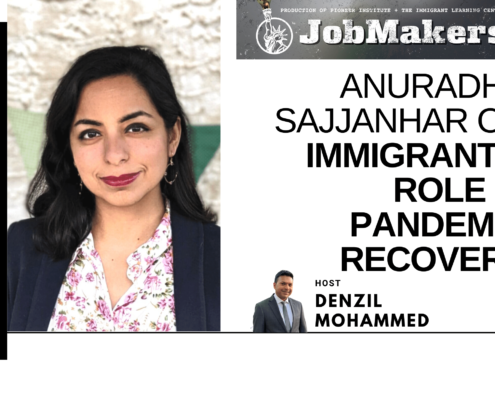
Anuradha Sajjanhar, PhD on Immigrants’ Role in Pandemic Recovery

Rodrigo Souza Cooks Up Success
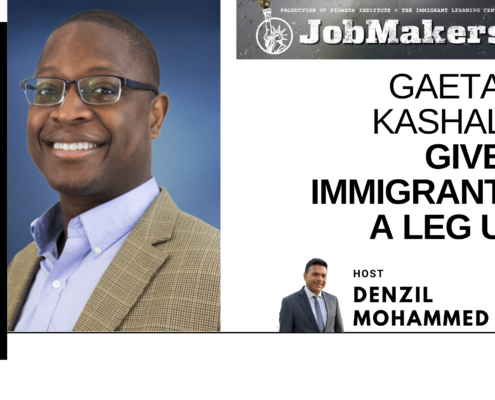
Gaetan Kashala Gives Immigrants a Leg Up
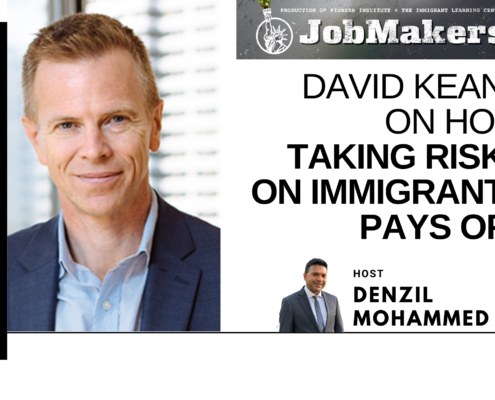
David Keane On How Taking Risks On Immigrants Pays Off
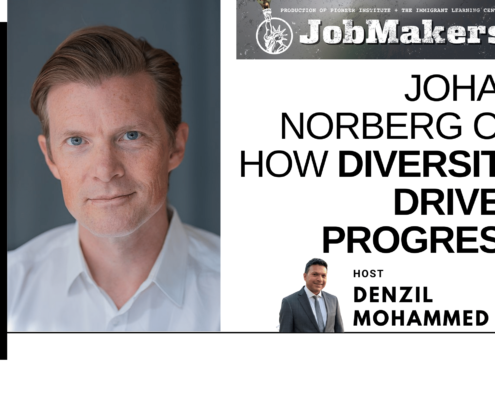
Johan Norberg on How Diversity Drives Progress
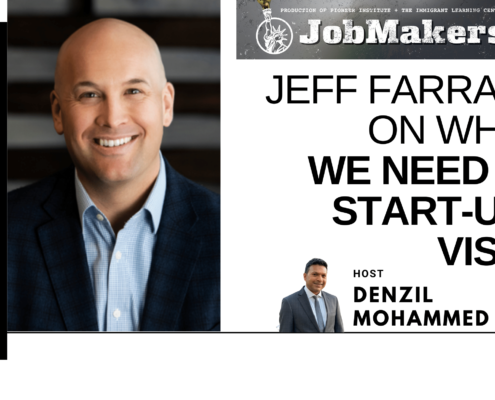
Jeff Farrah on Why We Need a Start-Up Visa
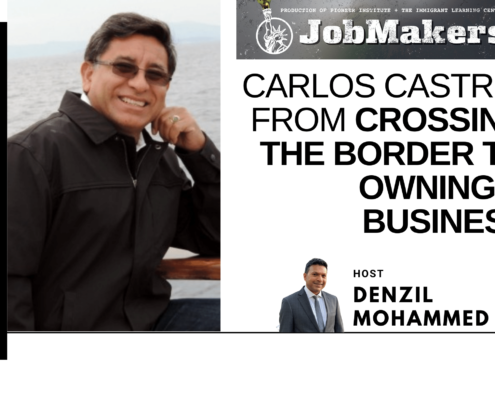
Carlos Castro: From Crossing the Border to Owning a Business
